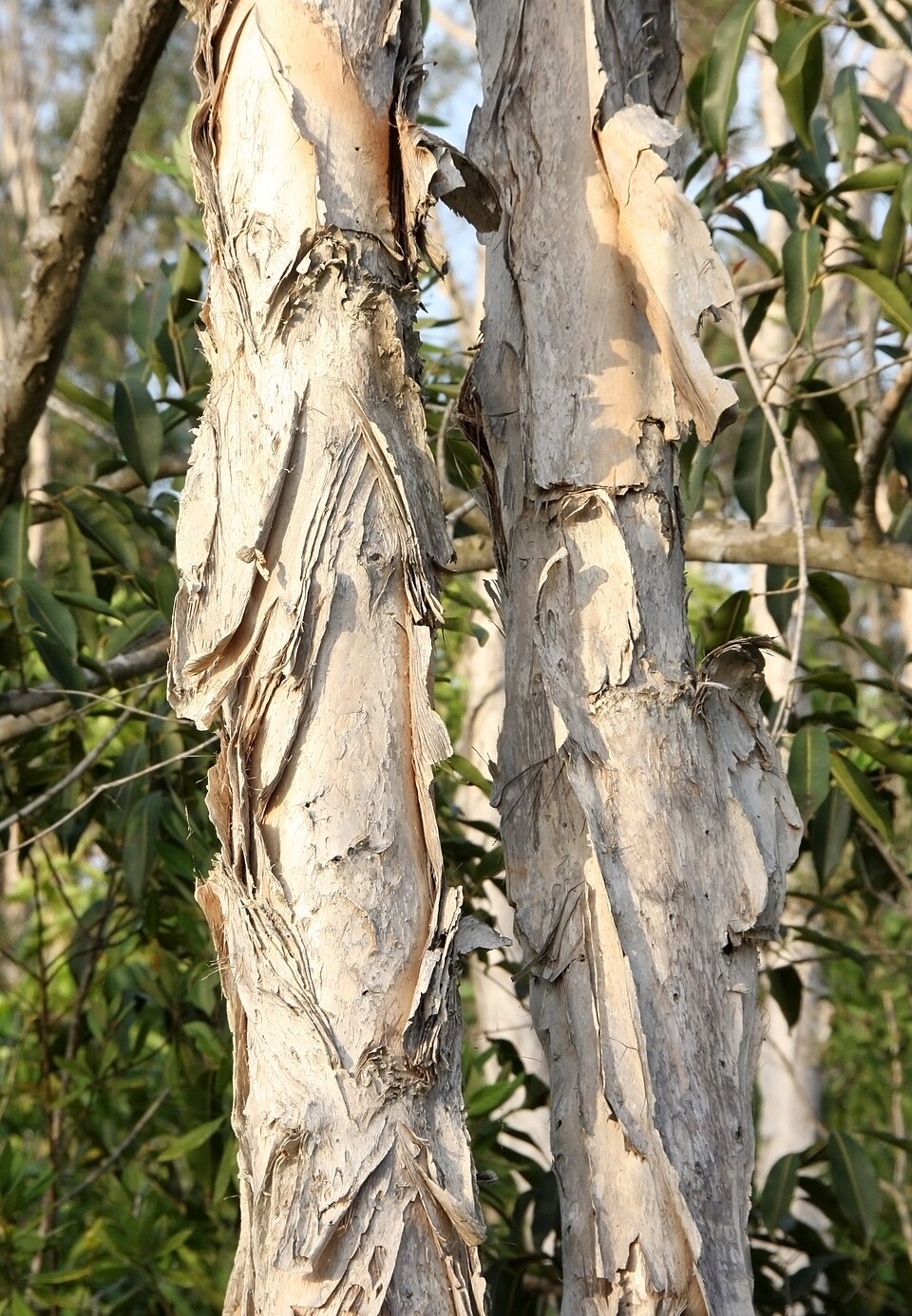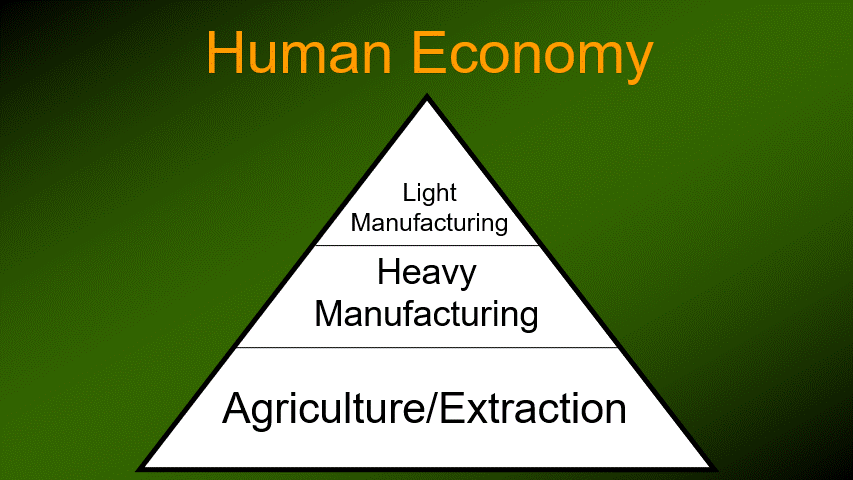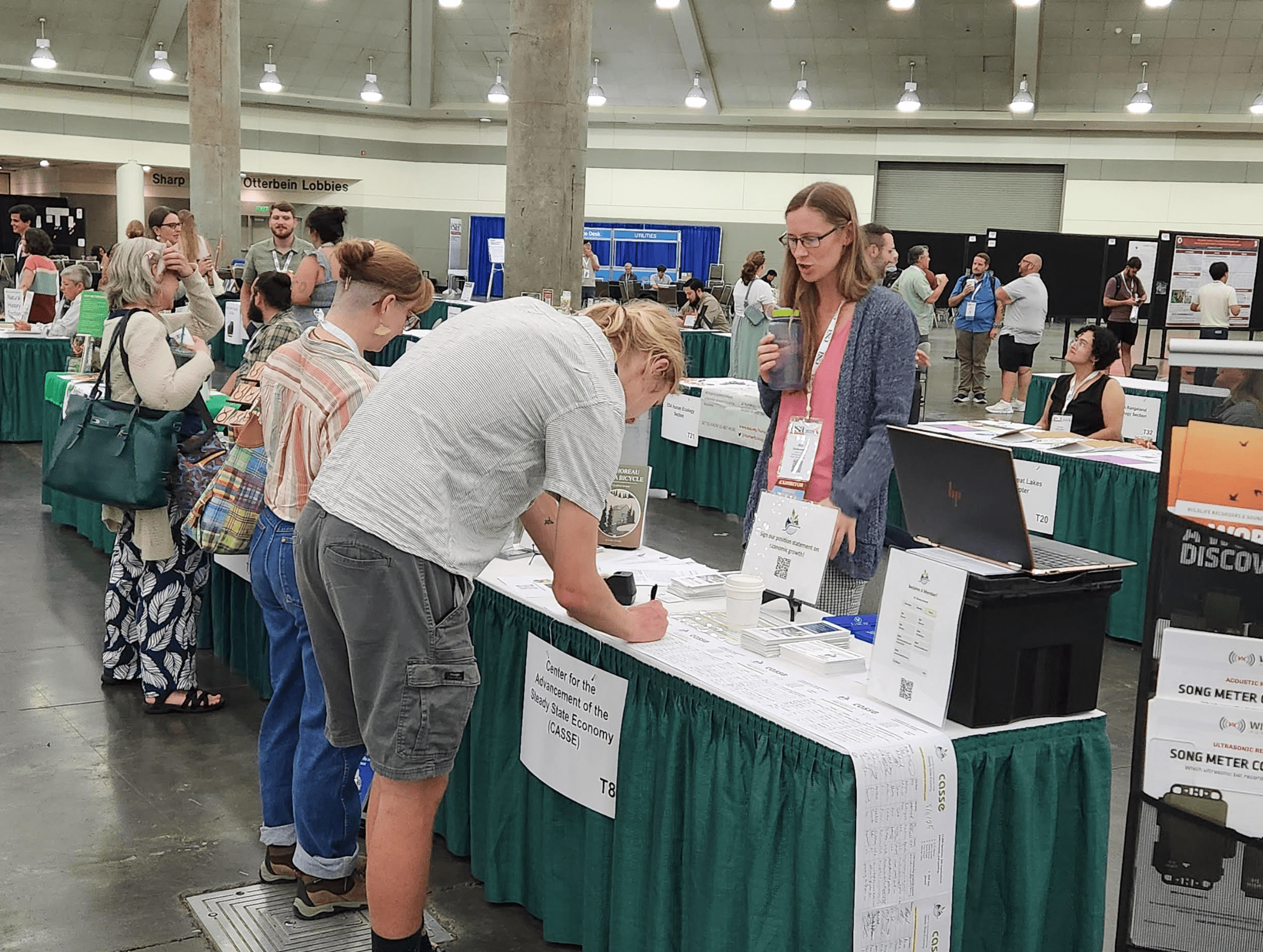The Ecological Society of America’s (ESA) Annual Meeting concludes today in Baltimore, Maryland. Of the dizzying multitude of topics on the agenda, the most prevalent were wildlife conservation, forest ecology, and climate change. Meeting sessions focused on niche aspects of these topics: threatened wader species on Sonadia Island, the effects of endemic mistletoes on forest-floor invertebrates, and the impacts of warming on interactions between plants and symbionts, to name a few.
There weren’t many sessions focused on big-picture issues. The conference was catered to the ecologists in attendance, and their work is just as niche as their session presentations. Some of these ecologists are zoomed in to the microbial level. Alexandra Alexeiv participated in an interview for the Steady State Herald. She studies how interactions between the gut microbiome and the ubiquitous chemical Benzo[a]pyrene (B[a]P) affect the brain.
Another interviewee, Yuanming Lu, specializes in Melaleuca quinquenervia, commonly called paperbark. Lu studies its invasion of South Florida vegetation and the biological agents used to control it.
We need specialists like Alexeiv and Lu, monitoring the pulse of ecosystems and testing solutions. However, as long as the human economy continues to grow, solutions created and implemented within the confines of “ecology” will just be stopgaps.
To achieve the systemic transformation necessary to combat the multiple ecological crises we face, we need ecologists to draw connections to macroeconomics. We need them to realize that issues like B[a]P pollution and species invasion will only get worse if the global economy continues to grow. The voices of scientific experts hold a unique sway over policymakers and the general public. The Earth needs those voices in support of movements for degrowth to a steady state economy.
Ecologists Don’t Study Microbes (Solely) for Kicks and Giggles
Alexiev does get kicks and giggles out of microbes. Her voice filled with excitement as she explained that scientists have been researching microbiomes for over two decades, and there’s still so much to learn. “Each microbe carries out different functions, some of which are completely unique. There are microbes that can create their own electricity. There are microbes that eat iron.” She added that she has an obsession with miniature things: “Since microbiomes are small, that’s appealing to some visceral side of me that thinks they’re so adorable.”
But Alexiev doesn’t work toward healthy microbiomes just because they’re cute. She’s keenly aware that humans, and all species on Earth, depend upon functioning microbiomes. Alexiev’s research has revealed that exposure to B[a]P, which is produced when coal and oil are burnt, changes the gut microbiomes of zebrafish. The gut communicates with the brain via the vagus nerve. In this case, the fish’s gut changes led to anxiety, depression, and hyperactivity.

Paperbark’s flaky bark creates a thick litter layer that facilitates wildfires. (Ianaré Sévi, Wikimedia Commons)
“We’ve observed those patterns in humans. Moms exposed to a lot of B[a]P have kids with stronger ADHD symptoms.” Alexiev finds meaning in her research, but she feels it is not enough: “We’ve only just discovered this gut-brain axis is a thing. I only study one chemical effect on one model animal. It’s one little, tiny corner of the issue.”
Yuanming Lu also finds her invasive-species research fascinating. She relates it to her childhood in rural Shanghai. She would feed the ducks with a floating plant that grew abundantly in local creeks. It wasn’t until she was a PhD student that she realized the plant was water hyacinth, an invasive species introduced by the Chinese government. It was introduced to feed ducks, but it turned out not to be nutritious. Water hyacinth spread through the countryside, affecting water availability in Lu’s hometown.
Like Alexiev, Lu wants to protect the environment and translates this to protecting humans. When asked to summarize her research for a general audience, she said, “Basically, kill plants. I tell people how to kill plants, because we need to save our native vegetation.” With a sense of urgency, Lu shared that paperbark in South Florida is contributing to the disappearance of wetlands. “Once that fresh water is gone, it’s always gone. There’s no way to bring the fresh water back.”
From Microbiomes to Macroeconomics
Virtually all the issues ecologists study, from unhealthy microbiomes to climate change, share a common source: economic activity. The production and consumption of goods and services in the human economy cause pollution and habitat destruction that lead to a myriad of other complex ecological problems. As long as the economy grows, those problems will grow.
This clicked with virtually every ecologist I spoke to at the conference. The concept of a steady state economy is easily related to ecological concepts. Alexiev said,
We have this pattern in community ecology, as well: exponential growth simply doesn’t work. No biome can sustain eternal exponential growth, and I would hypothesize that economics works the same way. I don’t think any system can break that balance.
Lu related steady state economics to the concept of “stable states” in ecology.
“We say that an ecosystem is in a stable state when several species coexist. That state is hard to disturb, even if you give it a little force. But when we push a disturbance really far, past what we call a tipping point, it will go to another state entirely.”
Why Absolute Decoupling is a Pipe Dream, in Ecologist Speak
The trophic theory of money struck a chord with many conference attendees. Every ecologist is familiar with the concept of trophic levels, which represent the position of an organism in its ecosystem’s food web. In nature, nutrition and energy flow from plants to herbivores to carnivores.

All sectors rely upon an economic base of natural resources.
In the same way, materials and energy flow from extractive industries to heavy manufacturing to light manufacturing in the human economy. Advances in labor productivity in agriculture, specifically, have enabled the existence of other sectors. In fact, if farmers only grew enough food to feed themselves, there’d be no use for money.
This conceptual model illustrates why we cannot “absolutely decouple” economic growth from environmental impact. Not that ecologists need convincing of that. We received very little “green growth” pushback at the conference.
All Ecologists Should Be Steady Staters
Limits to economic growth was a no-brainer to most of the attendees I spoke with. However, levels of interest and enthusiasm for a steady state economy varied greatly. Many ecologists seemed to feel that a) they don’t know enough about economics to contribute to the discourse, b) they are powerless compared to economists and policymakers, or c) there’s no stopping the growth train, so we’ll just have to face the consequences.

Almost 150 conference attendees signed CASSE’s position on economic growth.
When asked if and how she could see herself supporting steady-state initiatives, Alexiev shared a story. As a graduate student, she went with a group to speak to political representatives in DC. “It felt like a lot of work to get them to listen for five or ten minutes, and we couldn’t convey even a little bit of what mattered to us as scientists. It didn’t feel very hopeful.” Alexiev said she wouldn’t devote much time to something like that again, but she would certainly vote for steady-state policies if given the opportunity.
Lu admitted that she “kind of intentionally ignores the economy.” When asked whether ecologists should care about economics, she said, “Ecologists always say vice versa: Economists, please see us. We need some support from economists.”
But ecologists aren’t powerless—or clueless—when it comes to economics. As professionals immersed in Earth’s processes, ecologists understand fundamental truths about the human economy that many economists do not. What’s more, they tend to be regarded by the general public and policymakers as unbiased producers and communicators of knowledge.
We need ecologists’ support to advance the steady state economy. This is not a call for every ecologist to throw in the towel and become an economist (though ecological economics would benefit from more bright minds). We need experts in niche topics, tracking Earth’s pulse.
Ecologists, this is a call to emerge from your niche occasionally, enough to acknowledge the root cause of the issues you study. You don’t need to start a new movement. There’s an existing movement of academics and activists establishing the need for degrowth to a steady state economy and raising awareness of this need.
If you don’t want future generations to have to keep fighting your uphill battles, show your support for these movements whenever you get a chance. Engage in research collaborations with ecological economists, incorporate economic implications into your research papers, and voice your support for steady-state policies. You can start by signing CASSE’s position statement on economic growth!
Teaser image credit: By Forest & Kim Starr, CC BY 3.0, https://commons.wikimedia.org/w/index.php?curid=6116861. By Forest & Kim Starr, CC BY 3.0, https://commons.wikimedia.org/w/index.php?curid=6116861
